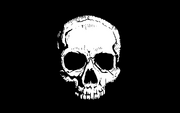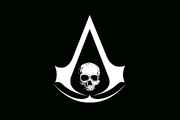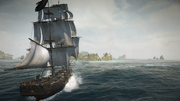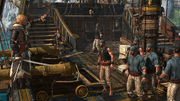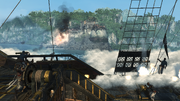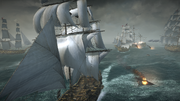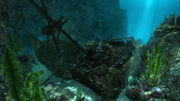(→Trivia) |
Tobstalarone (talk | contribs) (Expanded ‘Trivia’ on level.) |
||
| (4 intermediate revisions by one other user not shown) | |||
| Line 237: | Line 237: | ||
*The ''Jackdaw''{{'}}s sail positioning did not extend horizontally as far as the other brigs encountered in the West Indies, resembling the positioning of a [[frigate]] more closely. |
*The ''Jackdaw''{{'}}s sail positioning did not extend horizontally as far as the other brigs encountered in the West Indies, resembling the positioning of a [[frigate]] more closely. |
||
*The 'Black Skull Sails' that could be obtained for the ''Jackdaw'' were referred to as the 'Jackdaw's sails' in ''Assassin's Creed: Rogue''. |
*The 'Black Skull Sails' that could be obtained for the ''Jackdaw'' were referred to as the 'Jackdaw's sails' in ''Assassin's Creed: Rogue''. |
||
| − | *The ''Jackdaw'', the ''[[Morrigan]]'' and later the [[Aquila]] featured cannons on the top deck, even though placing them there would add too much weight to the ship and would likely cause it to sink. The cannons would also be trip hazards, as the top deck is meant for sailing purposes. |
+ | *The ''Jackdaw'', the ''[[Morrigan]]'' and later the ''[[Aquila]]'' featured cannons on the top deck, even though placing them there would add too much weight to the ship and would likely cause it to sink. The cannons would also be trip hazards, as the top deck is meant for sailing purposes. |
**It was decided to overlook this inconsistency in order to add to the sense of progression when upgrading the ''Jackdaw'', and to make it easier for players to know which cannons were being fired.<ref>[http://blog.ubi.com/assassins-creed-iv-black-flag-historical-accuracy-vs-gameplay/ ''Assassin’s Creed IV Black Flag'' – Historical Accuracy vs. Gameplay]</ref> |
**It was decided to overlook this inconsistency in order to add to the sense of progression when upgrading the ''Jackdaw'', and to make it easier for players to know which cannons were being fired.<ref>[http://blog.ubi.com/assassins-creed-iv-black-flag-historical-accuracy-vs-gameplay/ ''Assassin’s Creed IV Black Flag'' – Historical Accuracy vs. Gameplay]</ref> |
||
| + | *In real life, with 46 cannons, the ''Jackdaw'' would be considered a fifth-rate ship-of-the-line, by the standard classification of the Royal Navy. |
||
*In ''[[Assassin's Creed: The Essential Guide]]'', the ''Jackdaw'' is referred to as a {{Wiki|brigantine}}. This is erroneous because on a brigantine, the {{Wiki|mainsail}} is {{Wiki|gaff rig|gaff-rigged}} with the sails above it {{Wiki|square rig|square-rigged}}. On a brig, such as the ''Jackdaw'', the entire mast is dominated by square-rigged sails (i.e. the mainsail is also square-rigged), with a small gaff-rigged, fore-and-aft sail as a supplementary component. |
*In ''[[Assassin's Creed: The Essential Guide]]'', the ''Jackdaw'' is referred to as a {{Wiki|brigantine}}. This is erroneous because on a brigantine, the {{Wiki|mainsail}} is {{Wiki|gaff rig|gaff-rigged}} with the sails above it {{Wiki|square rig|square-rigged}}. On a brig, such as the ''Jackdaw'', the entire mast is dominated by square-rigged sails (i.e. the mainsail is also square-rigged), with a small gaff-rigged, fore-and-aft sail as a supplementary component. |
||
*During [[Black Bart's Gambit]], using the spy glass while sailing the [[Royal Fortune|Man O' War]], you can observe that the ''Jackdaw'' is a level 45 ship. |
*During [[Black Bart's Gambit]], using the spy glass while sailing the [[Royal Fortune|Man O' War]], you can observe that the ''Jackdaw'' is a level 45 ship. |
||
| + | **This is likely an under-estimation, as it sells the capability of the ship short; the Jackdaw can hold its own and come off victorious in a broadside battle even with level 60 Men O’ War, far less manoeuvrable ships that do not boast features such as a naval ram or swivel guns. Considering this, a more realistic level would probably be somewhere closer within the vicinity of the five level 75 ‘Legendary Ships’ in the game. |
||
==Gallery== |
==Gallery== |
||
Revision as of 00:04, 4 May 2020
- "This country here is my best chance. This country called Jackdaw, where I know the names of all the citizens and they know mine, and we work together. Not always out of love, but to keep our country afloat."
- ―Adéwalé to Edward Kenway, 1717.[src]
The Jackdaw was a brig captained by the pirate-turned-Assassin Edward Kenway, which he obtained with the help of Adéwalé, during the Golden Age of Piracy in the Caribbean.
Before Kenway's captaincy, the ship was known as El Dorado, and formed a part of the Spanish Treasure Fleet. Upon securing her, Kenway renamed the vessel Jackdaw, after the bird of the same name.
History
Procurement
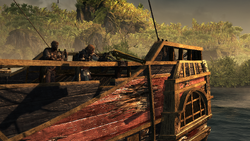
Adéwalé and Edward assessing the damage done to El Dorado
After an imprisoned Edward Kenway was placed on a ship in the fleet bound for Spain, he met his future quartermaster, Adéwalé, who helped free Edward from the bilboes and assisted him in incapacitating the guards until the pirates retrieved their equipment.[1]
Following this, the pair secured a crew by freeing other prisoners from their Spanish captors, and set their sights on a brig within the fleet, El Dorado. Subsequently, Kenway used the pirates he freed to escape from the fleet under the cover of a hurricane. While El Dorado managed to successfully navigate the natural disaster, the remaining ships sank during the pursuit. Later on, Kenway then rechristened the ship the Jackdaw, after a small, swift bird from his homeland of Wales.[1]
Piracy
- Edward: "It's a shaky feeling, sailing around with this much stolen cargo."
- Hornigold: "Get used to it. We'll need to take a few more prizes to make this a profitable day."
- —Edward Kenway and Benjamin Hornigold, after the Jackdaw took its first schooner, 1715.[src]
The Jackdaw's first major act of piracy took place off of the coast of Nassau in 1715, when captain Benjamin Hornigold showed Kenway how to successfully take a ship. It was after this voyage that the brig was given its very own black flag.[1]
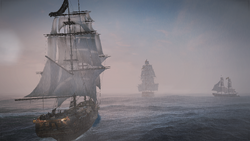
The Jackdaw tailing El Arca del Maestro
Soon after, it was used to transport Kenway to Cat Island to plunder a plantation, and eventually followed a Spanish Man O' War, El Arca del Maestro, through the Bahamas to its moorings at Great Inagua. Kenway then infiltrated the island, killed the French Templar Julien du Casse and took both the ship and the island. It was here that he would establish his own base of operations, and the Jackdaw could often be found moored at the docks in the cove.[1]
The Jackdaw traveled across the West Indies Sea to the ancient city of Tulum, home of the Caribbean Assassins, where the crew members were soon taken prisoner by Laurens Prins; Kenway soon freed his crew and they returned to sea. Shortly after, the ship took its first fort, located at Punta Guarico, and made sail for Kingston. After Kenway killed Prins, the ship returned to Nassau.[1]
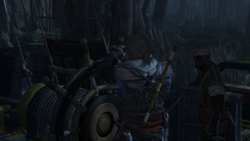
Edward steering the Jackdaw through a bayou
However, the Pirate Republic was suffering from disease, prompting Kenway to outfit the Jackdaw with a diving bell in search for medicines. When he came up empty, he followed his fellow pirate Edward Thatch to Charles-Towne to secure medicines before returning again to Nassau.[1]
After the city was blockaded by the British, the Jackdaw, along with Charles Vane's ship, the Ranger, was able to escape and flee to Great Inagua. There, Kenway made plans to find Thatch again and set sail for Ocracoke. When the pirates were ambushed by the Royal Navy, the Jackdaw was the only vessel to escape.[1]
The Jackdaw and the Ranger met up again off the coast of Cuba, in pursuit of a ship that would lead them to Bartholomew Roberts. However, Vane's associate Jack Rackham had engineered a mutiny, taking the Jackdaw and leaving Kenway and Vane marooned on Isla Providencia.[1]
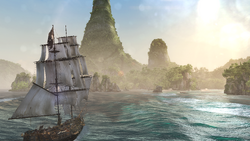
The Jackdaw approaching Príncipe
Kenway managed to make his way back to Great Inagua, where Adéwalé and Mary Read had taken the Jackdaw from Rackham. Kenway soon set sail again, returning to Kingston before continuing on to Príncipe, where Roberts had gone into hiding. After freeing Roberts, he followed him to the coast of Mexico, where the two infiltrated and battled a Portuguese fleet before sailing for the Observatory, Kenway's ultimate goal.[1]
Along the way, the Jackdaw chased Hornigold's ship, the Benjamin, through a fog bank before Kenway assassinated his former friend, clearing the way to the Observatory. When Roberts betrayed Edward deep inside the complex, Adéwalé and the crew quickly fled without their captain. It would be almost a year before Kenway would be reunited with his ship in Kingston, although Adéwalé chose not to join his captain, revealing his intentions to join the Assassin Order and suggesting that Edward do the same.[1]
Alliance with the Assassins
Shortly thereafter, the vessel returned again to Tulum, where Edward allied himself with the Assassins and received three targets: Woodes Rogers, Laureano Torres, and Roberts. The Jackdaw's flag was replaced with one bearing an Assassin insignia, and Anne Bonny took Adéwalé's place as quartermaster.[1]
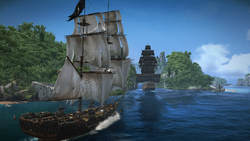
The Jackdaw pursuing the Royal Fortune
Edward sailed for Kingston to eliminate Rogers. In turn, the Templar revealed Roberts' location in Príncipe, where the Jackdaw sailed next. In a tremendous battle between the Jackdaw, Roberts' ship Royal Fortune, and a Spanish fleet, Kenway managed to kill Roberts and retrieve the Observatory's Crystal Skull.[1]
The ship then carried her captain back to Havana, where Edward discovered Torres was already on his way to the Observatory. He soon followed in hot pursuit, making his way through the jungle and the complex, before finally killing the Grand Master. The Jackdaw then made one last trip back to Great Inagua, where Edward finally retired from piracy, deciding to care for his newly discovered daughter Jennifer Scott.[1]
In 1722, Edward, Jennifer, and the crew left Great Inagua and sailed the Jackdaw to Bristol in the United Kingdom, stopping on one of the islands of the Azores along the way. Near the Bristol Channel, the black flag of the Jackdaw was bought down, folded and placed carefully inside a chest in the captain's cabin. The Jackdaw then flew a Red Ensign to gain permission to dock in Bristol.[2]
Two days later, Edward used the Jackdaw as an auxiliary when he was about to kill Matthew Hague. The former pirate imprisoned Hague in the captain's cabin of his ship, the Charlotte, after which the Jackdaw's crew tossed Edward barrels of tar which he could use to set alight Hague's ship. However, Edward was interrupted by Sir Robert Walpole, who wanted to make peace between the Assassin and the Templar. The pair came to an agreement, with Edward releasing Hague and Walpole giving a pardon and small properties to the pirates.[2]
Soon after, Edward donated the Jackdaw to the Assassin Brotherhood,[3] though he kept her original wheel in the basement hidden below his mansion in London and it was used as part of a mechanism for opening a secret exit.[4] It is unknown what happened to the Jackdaw in the intervening years, but at some point prior to 1735, the brig had returned to the West Indies, where she sank off the coast of Hispaniola due to unknown circumstances. Its figurehead was later recovered from the wreckage by Adéwalé.[5]
Schematics
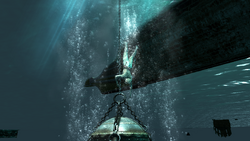
Edward using the ship's diving bell
The Jackdaw was 60 meters long from her stern to the tip of her bowsprit, 48.5 meters high, had a width of 11.9 meters, and also had twenty-six sails. Accompanying this, the Jackdaw was armed with forty-six broadside cannons, four chaser cannons, and two swivel guns. Further, she could hold 160 fire barrels, deployed four at a time, 25 volleys of heated shot, and 20 mortar rounds, and was equipped with an iron-plated naval ram. Besides her weaponry, she could also hold a maximum of 2,000 pieces of each type of cargo; sugar, rum, cloth, wood, and metal.[1]
At her strongest, the Jackdaw possessed a sizable amount of iron-plating reinforcement across her hull, which provided ample protection in combat against a number of Men O' War. The brig was able to disable and destroy any type of ship, given the proper strategy in battle.[1]
She was also equipped with a diving bell for exploration of various underwater wrecks, as well as a whaling rowboat and harpoons, which allowed Edward to hunt for local sea life. Her masts featured pedal-activated lifts and hooks to allow for both ascension and descent. The Jackdaw also had cleverly placed swinging ropes secured both on deck and in the cross-masts, which were used by the crew to swing from one ship to another during boarding, and to quickly leap off the ship into the ocean or onto land.[1]
Notable conflicts
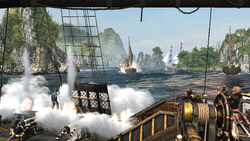
The Jackdaw engaging Portuguese ships
While the Jackdaw did not participate in any major historical battles of the era, she still had more than her fair share of legendary combat. Notable skirmishes, such as the battle which took Blackbeard's life near Ocracoke, the conflict with Hornigold's ship, the Benjamin, and the later conflict off the coast of Príncipe – in which Bartholomew Roberts was killed – were fought on the Jackdaw's decks.[1]
The ship was a formidable raider in the Caribbean, as it single-handedly outgunned and destroyed all of the naval forts around the Caribbean over time, and took down many ships, from gunboats to Men O' War, including the five legendary ships that roamed the Caribbean Sea: El Impoluto, the twin ships HMS Fearless and Royal Sovereign, La Dama Negra, and HMS Prince.[1]
- El Arca del Maestro beached while in pursuit of Templar Julien du Casse
- El Impoluto sunk during a skirmish
- Hercules (brig) sunk during a skirmish
- Hercules (frigate) sunk while in pursuit of Templars the Thomson Brothers
- HMS Courage sunk during a skirmish
- HMS Defiance sunk during a skirmish
- HMS Fearless sunk during a skirmish
- HMS Prince sunk during a skirmish
- La Dama Negra sunk during a skirmish
- Royal African Pearl captured during a skirmish
- Royal Sovereign sunk during a skirmish
- San Lorenzo captured during a skirmish
Crew
- Edward Kenway – Captain (30 July 1715 – 23 November 1718, 1719 – 1723)
- Jack Rackham – Captain (23 November 1718 – c. 23 January 1719)
- Adéwalé – Quartermaster (1715 – 1721)
- Anne Bonny – Quartermaster (1721 – 1722)
- Hanley – Quartermaster (1722 - 1723)[2]
- Birtwistle – Coxswain (1723)[2]
Behind the scenes
Upgrades
Through crafting, Edward could upgrade the Jackdaw in a number of ways to enhance its weapons strength, hull durability, speed, cargo hold, and crew capacity, and whaling equipment.
Ship cosmetics
A wide variety of figureheads, sail designs and wheels are available for the Jackdaw.
Figureheads
| Image | Name | Description | Availability |
|---|---|---|---|
| Death Vessel Figurehead | Available through the Death Vessel Pack | ||
| Kraken Figurehead | Available through the Kraken Ship Pack | ||
| Altaïr's Figurehead | Available through the Crusader & Florentine Pack | ||
| Ezio's Figurehead | Available through the Crusader & Florentine Pack | ||
| Aveline's Figurehead | Aveline DLC | ||
| The Black Ship's Figurehead | Black Island | ||
| The Revenge's Figurehead | Mystery Island |
Sails
| Image | Name | Description | Availability |
|---|---|---|---|
| Death Vessel Sails | Available through the Death Vessel Pack | ||
| Kraken Sails | Available through the Kraken Ship Pack | ||
| Altaïr's Sails | Available through the Crusader & Florentine Pack | ||
| Ezio's Sails | Available through the Crusader & Florentine Pack | ||
| The Black Ship's Sails | Black Island | ||
| The Revenge's Sails | Mystery Island |
Wheels
| Image | Name | Description | Availability |
|---|---|---|---|
| Death Vessel Wheel | Available through the Death Vessel Pack | ||
| Kraken Wheel | Available through the Kraken Ship Pack | ||
| Ivory Wheel | Available through the Illustrious Pirates Pack | ||
| Iron Wheel | Available through the Illustrious Pirates Pack |
Trivia
- When the Jackdaw was owned by the Spanish Navy, it was the only military-class ship with swivel guns and fire barrels, and also to have cannons on the main deck.
- Like many other references to the Assassin Order involving avians, a jackdaw is a small, black bird belonging to the crow family. Coincidentally, the color of the bird's feathers themselves could also be a reference to piracy often being symbolized by black.
- Jackdaw are prominently featured in both Greek and Welsh folklore as creatures of extreme vanity and thieves of anything shiny, as well as acting as omens of death and calamity. In The Vain Jackdaw, a jackdaw sought to become king of the birds by adorning himself with the feathers of other birds. Such tales are great illustrations of the motivations attributed to pirates like Edward Kenway.
- Darby McDevitt mentioned the Jackdaw's name was also a reference to the fable of the Eagle and the Jackdaw by Aesop, which is recited during the "Delirium" memory.
- The former name of the ship, El Dorado, is Spanish for "the gilded one; the golden". It is also a name of a legendary city filled with treasures that several explorers and adventurers sought to find, referencing Edward's desire for fame and wealth.
- In the captain's cabin, there was a statue of a vulture near the Jackdaw's rear window. There was also a bust of an unknown man in the right corner. Other cabin decorations included several flags, lanterns, a desk, and some chairs, along with a miniature model of the ship and a tailor's mannequin.
- The Jackdaw initially flew a plain black flag, then a generic pirate flag for most of its time under Kenway's command. After Edward defended the Assassins from a Spanish raid, the flag changed to include the Assassin insignia around the skull.
- At elite level, most of the Jackdaw's equipment, including the swivel guns, broadside, and mortars, were plated gold. The elite hull upgrade also included liberal gold and iron plating on the ship's hull and deck.
- After defeating all legendary ships, the Jackdaw gained a charge attack, allowing her to inflict greater damage on an enemy ship.
- The Jackdaw's crew was composed of mixed races and ethnicities. Sailors that joined Edward hailed from a variety of places, including Britain, Spain, Italy, Germany, and several countries in Africa, among others.
- The Jackdaw's sail positioning did not extend horizontally as far as the other brigs encountered in the West Indies, resembling the positioning of a frigate more closely.
- The 'Black Skull Sails' that could be obtained for the Jackdaw were referred to as the 'Jackdaw's sails' in Assassin's Creed: Rogue.
- The Jackdaw, the Morrigan and later the Aquila featured cannons on the top deck, even though placing them there would add too much weight to the ship and would likely cause it to sink. The cannons would also be trip hazards, as the top deck is meant for sailing purposes.
- It was decided to overlook this inconsistency in order to add to the sense of progression when upgrading the Jackdaw, and to make it easier for players to know which cannons were being fired.[6]
- In real life, with 46 cannons, the Jackdaw would be considered a fifth-rate ship-of-the-line, by the standard classification of the Royal Navy.
- In Assassin's Creed: The Essential Guide, the Jackdaw is referred to as a brigantine. This is erroneous because on a brigantine, the mainsail is gaff-rigged with the sails above it square-rigged. On a brig, such as the Jackdaw, the entire mast is dominated by square-rigged sails (i.e. the mainsail is also square-rigged), with a small gaff-rigged, fore-and-aft sail as a supplementary component.
- During Black Bart's Gambit, using the spy glass while sailing the Man O' War, you can observe that the Jackdaw is a level 45 ship.
- This is likely an under-estimation, as it sells the capability of the ship short; the Jackdaw can hold its own and come off victorious in a broadside battle even with level 60 Men O’ War, far less manoeuvrable ships that do not boast features such as a naval ram or swivel guns. Considering this, a more realistic level would probably be somewhere closer within the vicinity of the five level 75 ‘Legendary Ships’ in the game.
Gallery
Appearances
- Assassin's Creed IV: Black Flag (first appearance)
- Freedom Cry (wreckage only)
- Assassin's Creed: Black Flag
References
- ↑ 1.00 1.01 1.02 1.03 1.04 1.05 1.06 1.07 1.08 1.09 1.10 1.11 1.12 1.13 1.14 1.15 1.16 1.17 Assassin's Creed IV: Black Flag
- ↑ 2.0 2.1 2.2 2.3 Assassin's Creed: Black Flag
- ↑ Darby McDevitt's Twitter
- ↑ Assassin's Creed: Syndicate
- ↑ Assassin's Creed IV: Black Flag - Freedom Cry
- ↑ Assassin’s Creed IV Black Flag – Historical Accuracy vs. Gameplay


